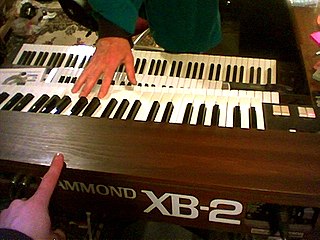
An electronic musical instrument or electrophone is a musical instrument that produces sound using electronic circuitry. Such an instrument sounds by outputting an electrical, electronic or digital audio signal that ultimately is plugged into a power amplifier which drives a loudspeaker, creating the sound heard by the performer and listener.

Evangelos Odysseas Papathanassiou, known professionally as Vangelis, was a Greek musician, composer, and producer of electronic, progressive, ambient, and classical orchestral music. He composed the Academy Award-winning score to Chariots of Fire (1981), as well as for the films Blade Runner (1982), Missing (1982), Antarctica (1983), The Bounty (1984), 1492: Conquest of Paradise (1992), and Alexander (2004), and the 1980 PBS documentary series Cosmos: A Personal Voyage by Carl Sagan.

Yamaha Corporation is a Japanese musical instrument and audio equipment manufacturer.

An electronic keyboard, portable keyboard, or digital keyboard is an electronic musical instrument based on keyboard instruments. Electronic keyboards include synthesizers, digital pianos, stage pianos, electronic organs and digital audio workstations. In technical terms, an electronic keyboard is a rompler-based synthesizer with a low-wattage power amplifier and small loudspeakers.

The Yamaha DX7 is a synthesizer manufactured by Yamaha Corporation from 1983 to 1989. It was the first successful digital synthesizer and is one of the best-selling synthesizers in history, selling more than 200,000 units.

Spiral is a studio album by the Greek electronic composer Vangelis, released in December 1977. It was the third album produced by Vangelis in Nemo Studios, London, which was his creative base until the late 1980s. For the track "To the Unknown Man" Vangelis received the Midem International Instrumental award in 1978.

A keytar is a keyboard instrument similar to a synthesizer or MIDI controller that is supported by a strap around the neck and shoulders, similar to the way a guitar is held.

The Yamaha CS-80 is an analog synthesizer introduced by Yamaha Corporation in 1977. It supports true 8-voice polyphony, with two independent synthesizer layers per voice each with its own set of front panel controls, in addition to a number of hardwired preset voice settings and four parameter settings stores based on banks of subminiature potentiometers.
Sequential is an American synthesizer company founded in 1974 as Sequential Circuits by Dave Smith. In 1978, Sequential released the Prophet-5, the first programmable polyphonic synthesizer, which was widely used in the music industry. In the 1980s, Sequential was important in the development of MIDI, a technical standard for synchronizing electronic instruments.
Electone is the trademark used for electronic organs produced by Yamaha. With the exception of the top end performance models, most Electones are based on the design of the spinet electronic organ. Current models are completely digital and contain a variety of sounds, effects, and accompaniments, on top of the ability to store programming data onto memory devices.

The Yamaha Motif is a series of music workstation synthesizers, first released by Yamaha Corporation in August 2001. The Motif replaced the EX series in Yamaha's line-up and was also based on the early Yamaha S series. Other workstations in the same class are the Korg Kronos and the Roland Fantom G. The series' successor is Yamaha Montage, released in 2016, followed up by the Yamaha Montage M in 2023.

The Prophet-5 is an analog synthesizer manufactured by the American company Sequential. It was designed by Dave Smith and John Bowen in 1977. It was the first polyphonic synthesizer with fully programmable memory.

A clonewheel organ is an electronic musical instrument that emulates the sound of the electromechanical tonewheel-based organs formerly manufactured by Hammond from the 1930s to the 1970s. Clonewheel organs generate sounds using solid-state circuitry or computer chips, rather than with heavy mechanical tonewheels, making clonewheel organs much lighter-weight and smaller than vintage Hammonds, and easier to transport to live performances and recording sessions.

Steven Maxwell Porcaro is an American keyboardist, songwriter, singer, and film composer, known as one of the founding members of the rock band Toto and the last surviving Porcaro brother ; as the songwriter of "Human Nature" by Michael Jackson and songs by Toto; and as the composer of the TV series Justified. He has won three Grammys, including Record of the Year for "Rosanna" and Album of the Year for Toto IV, and three nominations.

The Yamaha CS30/CS30L is an analog keyboard synthesizer that was released in 1977. It is the top of the range in Yamaha's original line-up of monophonic synthesizers, others in the range being the CS5, CS10 and CS15. It features two voltage controlled oscillators (VCOs), two voltage controlled filters, two voltage controlled amplifiers (VCAs) and three envelope generators. It also sports a ring modulator and a voltage controlled low-frequency oscillator (LFO).

A synthesizer is an electronic musical instrument that generates audio signals. Synthesizers typically create sounds by generating waveforms through methods including subtractive synthesis, additive synthesis and frequency modulation synthesis. These sounds may be altered by components such as filters, which cut or boost frequencies; envelopes, which control articulation, or how notes begin and end; and low-frequency oscillators, which modulate parameters such as pitch, volume, or filter characteristics affecting timbre. Synthesizers are typically played with keyboards or controlled by sequencers, software or other instruments, and may be synchronized to other equipment via MIDI.

Cross Point is the sixth album and the fifth studio album by Casiopea, recorded and released in 1981. This is the band's second album to be created and produced with Harvey Mason. Casiopea did a domestic tour in late November and December after this album's release, which inspired the Mint Jams concert sessions in February of the following year.

The Yamaha CS-15 is a monophonic analog synthesizer produced by Yamaha from 1979 to 1982.

Yamaha Reface is a series of four synthesisers manufactured by the Yamaha Corporation. Released in the summer of 2015, the series is inspired by the company’s previously released synthesisers.

















